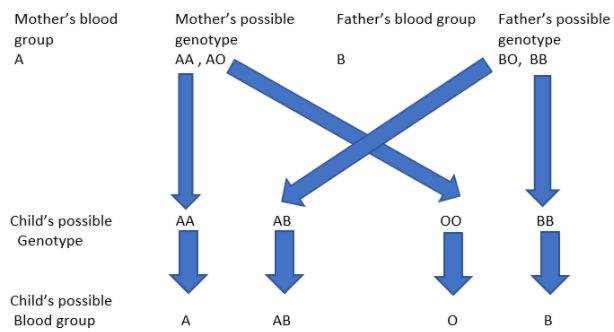
Parents have blood groups $A$ and $B$. Blood group of the child can be
(A) $A$ or $B$
(B) $O$
(C) $AB$
(D) All the above
Answer
568.5k+ views
Hint:Blood group in the body can be found by testing whether the particular antigens are present in the body or not. Antigens is defined as the substance that induces or triggers the body immune system if any foreign substance enter in to the body
Complete answer:
If the mother have the blood group $A$ and the father have the blood group $B$ or is the father have the blood of the type $A$ and the mother with the type $B$, then the child born to them will have either $A$ or $B$ or $AB$. Since $O$ is the common universal blood group, the child can also have this blood group. Hence all the given options are correct.
i) Blood group $A$: This blood has the antigen of the type $A$ and antibody of the type $B$.
ii) Blood group $B$: This blood has the antigen of the type $B$ and antibody of the type $A$.
iii) Blood group $AB$: This blood has the antigen of the type $A$ and $B$ and has no antibodies.
iv) Blood group $O$: This blood has no antigen and has antibodies of the type $A$ and $B$.

Thus the correct answer is option ‘D’,.
Note:Blood transfusion must be done very carefully. This is because the small change in the blood may lead to death. If the blood transfused does not match with the blood already present in the body, then the antigen present in the body triggers the antibody to kill the foreign blood antigens and this leads to death.
Complete answer:
If the mother have the blood group $A$ and the father have the blood group $B$ or is the father have the blood of the type $A$ and the mother with the type $B$, then the child born to them will have either $A$ or $B$ or $AB$. Since $O$ is the common universal blood group, the child can also have this blood group. Hence all the given options are correct.
i) Blood group $A$: This blood has the antigen of the type $A$ and antibody of the type $B$.
ii) Blood group $B$: This blood has the antigen of the type $B$ and antibody of the type $A$.
iii) Blood group $AB$: This blood has the antigen of the type $A$ and $B$ and has no antibodies.
iv) Blood group $O$: This blood has no antigen and has antibodies of the type $A$ and $B$.

Thus the correct answer is option ‘D’,.
Note:Blood transfusion must be done very carefully. This is because the small change in the blood may lead to death. If the blood transfused does not match with the blood already present in the body, then the antigen present in the body triggers the antibody to kill the foreign blood antigens and this leads to death.
Recently Updated Pages
Master Class 12 Economics: Engaging Questions & Answers for Success

Master Class 12 Physics: Engaging Questions & Answers for Success

Master Class 12 English: Engaging Questions & Answers for Success

Master Class 12 Social Science: Engaging Questions & Answers for Success

Master Class 12 Maths: Engaging Questions & Answers for Success

Master Class 12 Business Studies: Engaging Questions & Answers for Success

Trending doubts
Which are the Top 10 Largest Countries of the World?

What are the major means of transport Explain each class 12 social science CBSE

Draw a labelled sketch of the human eye class 12 physics CBSE

What is a transformer Explain the principle construction class 12 physics CBSE

Why cannot DNA pass through cell membranes class 12 biology CBSE

Differentiate between insitu conservation and exsitu class 12 biology CBSE




